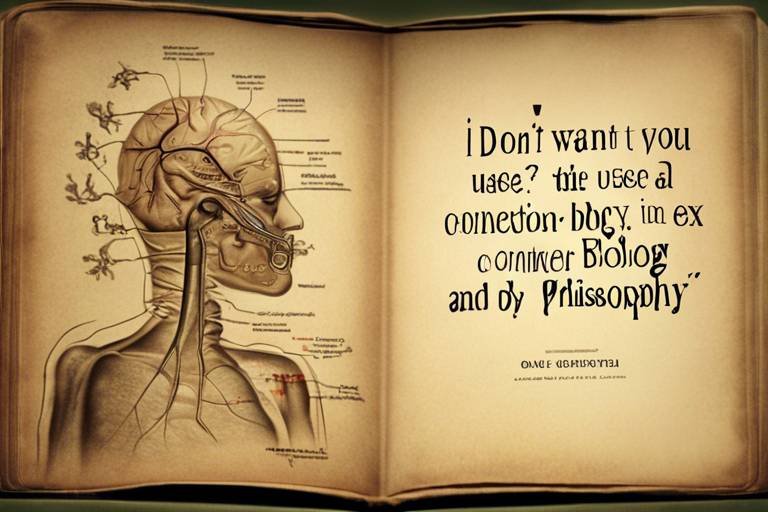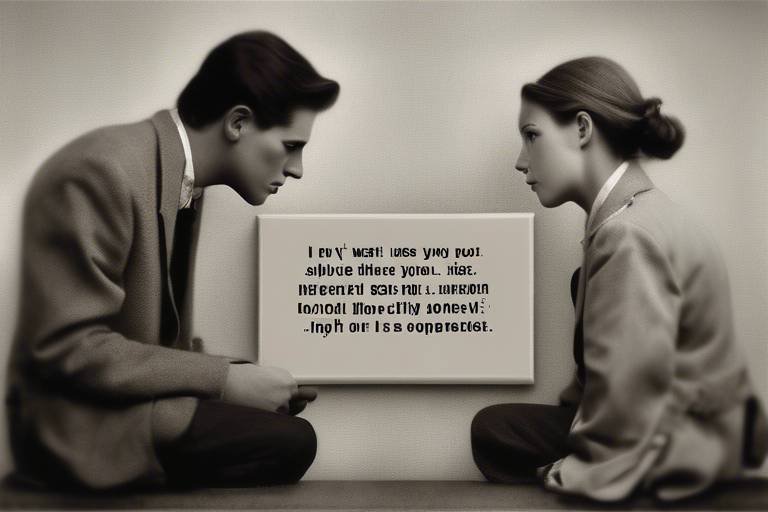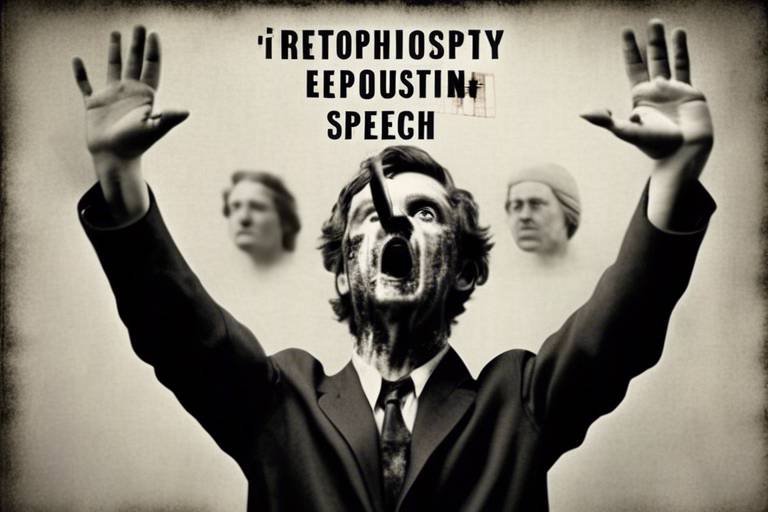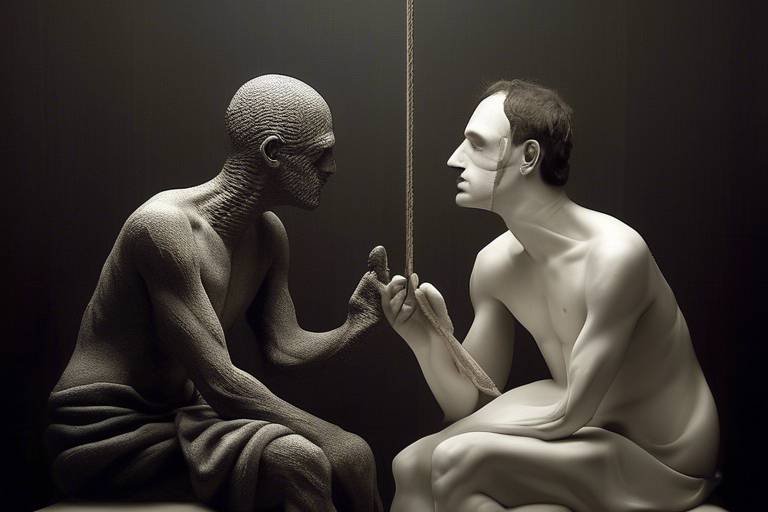The Philosophy of Consciousness - An Insight into the Human Mind
Consciousness is one of the most profound mysteries of human existence. It’s that elusive quality that allows us to experience the world, to feel emotions, and to reflect on our thoughts. But what exactly is consciousness? Is it merely a byproduct of brain activity, or does it hold a deeper significance? As we dive into the intricate relationship between consciousness and philosophy, we’ll explore key theories, historical perspectives, and contemporary debates that shape our understanding of the human mind.
To grasp the essence of consciousness, we first need to define it. Consciousness can be described as the state of being aware of and able to think about one’s own existence, thoughts, and surroundings. However, this definition barely scratches the surface. Various philosophers and scientists have attempted to articulate its complexities, leading to a myriad of interpretations. For instance, some argue that consciousness is a continuum, ranging from basic awareness in animals to the self-reflective consciousness found in humans. Others suggest that it involves not just awareness but also the ability to process and respond to that awareness. In essence, consciousness is a multifaceted phenomenon that continues to baffle and inspire inquiry.
Throughout history, the concept of consciousness has evolved dramatically. From ancient philosophical inquiries to modern scientific approaches, our understanding of consciousness has been shaped by countless thinkers. Early philosophers like Plato and Aristotle laid the groundwork for future explorations, each offering unique insights into the nature of the mind and soul.
Let’s take a closer look at the contributions of these early thinkers. Plato, for instance, presented the famous Allegory of the Cave, which illustrates the difference between perceived reality and true knowledge. In this allegory, prisoners are chained inside a cave, only able to see shadows on the wall, mistaking these shadows for reality. This powerful metaphor suggests that enlightenment and true understanding require a journey beyond mere appearances, challenging us to question our own perceptions of consciousness.
Plato’s allegory serves as a poignant reminder of the limitations of our sensory experiences. It prompts us to consider whether our conscious experience is merely a shadow of a deeper reality. Are we, too, prisoners of our own minds, only seeing a fraction of what consciousness truly entails?
On the other hand, Aristotle introduced the concept of hylomorphism, which posits that substances are composed of both matter and form. This idea provides a framework for understanding how the mind (form) and body (matter) interact. Aristotle’s perspective influenced later discussions on identity and consciousness, laying the groundwork for the dualistic and physicalist theories that would emerge in modern philosophy.
Fast forward to contemporary times, and we find ourselves amidst a rich tapestry of philosophical theories. Dualism, for example, posits that the mind and body are distinct entities, while physicalism argues that everything about consciousness can be explained through physical processes. These debates continue to shape our understanding of consciousness and raise questions about the nature of reality itself. Can consciousness be fully explained by science, or is there something inherently mysterious about our subjective experiences?
As we delve deeper into the science of consciousness, we encounter a fascinating intersection of neuroscience and psychology. Researchers are tirelessly working to unravel the biological underpinnings of consciousness, seeking to understand how brain activity correlates with our conscious experiences. For instance, studies using advanced imaging techniques have shown that specific areas of the brain light up during different conscious states, providing tantalizing clues about the relationship between brain function and awareness.
Neuroscience has made remarkable strides in exploring consciousness. By examining brain activity, scientists can identify patterns that correspond to various conscious experiences. This research not only enhances our understanding of consciousness but also opens doors to potential treatments for disorders affecting awareness, such as coma or vegetative states.
Meanwhile, psychology offers its own insights into consciousness. Theories from cognitive psychology and behaviorism shed light on how consciousness influences behavior and mental processes. For example, cognitive psychology explores how our thoughts and perceptions shape our actions, emphasizing the role of consciousness in decision-making and problem-solving. Understanding these psychological dimensions is crucial for grasping the full spectrum of consciousness.
Today, the philosophy of consciousness is rife with debates that challenge our understanding of the mind. One of the most intriguing discussions revolves around the concept of qualia, the individual instances of subjective experience. How do we account for the unique flavor of our thoughts and feelings? This question leads us to the heart of philosophical inquiry about consciousness.
Qualia represent the rich tapestry of our personal experiences, from the taste of chocolate to the feeling of joy. These subjective experiences are difficult to quantify, yet they are central to understanding consciousness. Philosophers debate whether qualia can be explained through physical processes or if they represent a fundamental aspect of consciousness that remains elusive.
Another significant challenge is known as the hard problem of consciousness, articulated by philosopher David Chalmers. This problem highlights the difficulty of explaining why and how subjective experiences arise from physical processes in the brain. While we can identify brain activity associated with consciousness, the question of why we have subjective experiences at all remains unanswered. This enigma continues to perplex scientists and philosophers alike, fueling ongoing research and debate.
- What is consciousness? - Consciousness is the state of being aware of and able to think about one’s own existence, thoughts, and surroundings.
- How has the understanding of consciousness evolved? - From ancient philosophical inquiries to modern scientific approaches, our understanding has significantly changed over time.
- What are qualia? - Qualia are the individual instances of subjective experience, such as the taste of an apple or the feeling of happiness.
- What is the hard problem of consciousness? - The hard problem addresses the challenge of explaining why and how subjective experiences arise from physical processes in the brain.

[Defining Consciousness]
When we dive into the concept of consciousness, we're stepping into a realm that many describe as both fascinating and perplexing. What does it truly mean to be conscious? Is it merely the state of being awake, or is there a deeper layer of awareness that we often overlook? Consciousness encompasses a myriad of definitions, each attempting to capture the essence of our subjective experience. It’s like trying to hold water in your hands; the more you try to define it, the more elusive it becomes.
Philosophers and scientists alike have grappled with the complexities of consciousness. At its core, consciousness can be understood as the state of being aware of and able to think about one’s own existence, thoughts, and surroundings. However, this definition barely scratches the surface. Some argue that consciousness is not just about awareness but also involves the ability to reflect on one’s thoughts and emotions, creating a rich tapestry of experiences that shape our identity.
To better illustrate the nuances of consciousness, let's explore some of the key aspects that contribute to its definition:
- Awareness: The basic ability to perceive and respond to stimuli in the environment.
- Self-awareness: The recognition of oneself as an individual, distinct from others.
- Intentionality: The capacity of the mind to be directed towards something, whether it's a thought, an object, or an experience.
- Qualia: The subjective, qualitative aspects of conscious experience, such as the way we perceive colors, sounds, and emotions.
As we navigate through these definitions, it's essential to recognize that consciousness is not a one-size-fits-all concept. Different disciplines approach it from various angles. For example, in psychology, consciousness is often linked to cognitive processes, while in philosophy, it raises questions about the nature of reality and existence. This multifaceted approach is what makes the study of consciousness so intriguing and, at times, contentious.
In summary, defining consciousness is akin to trying to capture the wind; it’s an ever-changing phenomenon that eludes strict categorization. As we continue to explore this profound topic, we must remain open to the myriad interpretations and insights that arise from both philosophical inquiry and scientific research. The journey into understanding consciousness is not just about finding answers; it's about embracing the questions themselves.

[Historical Perspectives]
Throughout history, the concept of consciousness has been a subject of intense scrutiny and fascination. From the musings of ancient philosophers to the rigorous investigations of modern scientists, the quest to understand what it means to be conscious has shaped various fields of thought. The evolution of consciousness as a concept reflects not only changes in philosophical paradigms but also the advancements in scientific understanding. In this section, we will embark on a journey through time, exploring how different eras and thinkers have approached the enigma of consciousness.
In ancient times, philosophers like Plato and Aristotle laid the groundwork for our understanding of the mind and consciousness. Their ideas, though formulated centuries ago, continue to resonate in contemporary discussions. Plato, for instance, used allegories to illustrate complex ideas, while Aristotle introduced more systematic approaches to understanding the psyche. These early thinkers pondered questions that still perplex us today: What is the essence of being? How do we perceive reality? The answers they proposed set the stage for centuries of philosophical inquiry.
Let’s take a closer look at the contributions of these ancient philosophers, starting with Plato. His famous Allegory of the Cave serves as a powerful metaphor for the human condition. Imagine prisoners chained inside a dark cave, only able to see shadows cast on the wall. For them, these shadows represent reality. However, when one prisoner escapes and discovers the outside world, he realizes that the shadows were mere illusions. This allegory illustrates the difference between perceived reality and true knowledge, emphasizing the importance of enlightenment in understanding consciousness. Plato believed that true knowledge comes from the realm of forms, which are abstract, perfect concepts that exist beyond our sensory experiences.
Aristotle, on the other hand, offered a different perspective with his concept of hylomorphism. He posited that everything in the universe is a composite of form and matter. In this view, consciousness is not a separate entity but rather a quality that emerges from the interaction of the body and the soul. This idea influenced later discussions on identity and the nature of consciousness, suggesting that our awareness is deeply intertwined with our physical existence. Aristotle’s approach laid the foundation for a more empirical investigation of consciousness, paving the way for future thinkers to explore the mind-body relationship.
Fast forward to the modern era, and we see a shift in how consciousness is perceived. Philosophical theories such as dualism and physicalism emerged, each attempting to explain the relationship between the mind and body. Dualists argue that the mind and body are distinct entities, with consciousness existing separately from physical processes. In contrast, physicalists maintain that consciousness arises from brain activity and is fundamentally linked to our biological makeup. These debates continue to fuel discussions in both philosophy and science, as thinkers grapple with understanding the nature of consciousness in the context of a rapidly evolving worldview.
In summary, the historical perspectives on consciousness reveal a rich tapestry of thought that has evolved over centuries. From the allegorical insights of Plato to the empirical inquiries of Aristotle, and the modern philosophical debates, each era has contributed to our understanding of this complex phenomenon. As we delve deeper into the science of consciousness, we will see how these historical foundations continue to influence contemporary discussions and shape our understanding of the human mind.
- What is consciousness? Consciousness refers to the state of being aware of and able to think about one's own existence, thoughts, and surroundings.
- How has the understanding of consciousness evolved over time? The understanding of consciousness has evolved from ancient philosophical inquiries to modern scientific approaches, reflecting advancements in both philosophy and neuroscience.
- What are some key theories of consciousness? Key theories include dualism, which posits that mind and body are separate, and physicalism, which argues that consciousness arises from physical processes in the brain.

[Ancient Philosophers]
The journey into the realm of consciousness begins with the profound insights of ancient philosophers, who laid the groundwork for our modern understanding of the mind and awareness. Among these early thinkers, Plato and Aristotle stand out as pivotal figures whose ideas continue to resonate through the ages. Their explorations into the nature of consciousness were not mere academic exercises; they were deep inquiries into the essence of human existence itself.
Plato, in particular, was fascinated by the distinction between the world of appearances and the world of reality. His famous Allegory of the Cave serves as a powerful metaphor for this distinction. Imagine prisoners chained inside a dark cave, only able to see shadows cast on the wall by objects behind them. For these prisoners, the shadows represent their entire understanding of reality. Plato suggests that true enlightenment comes from breaking free of these chains and turning towards the light of the sun, which symbolizes the realm of Forms or ultimate truth. This allegory not only emphasizes the limitations of sensory perception but also highlights the philosopher's belief that consciousness is about seeking deeper truths beyond mere appearances.
On the other hand, Aristotle offered a different perspective with his concept of hylomorphism, which posits that all things are composed of both form and matter. According to Aristotle, consciousness is not a separate entity but rather an integral aspect of the living being. He argued that the soul is the form of the body, meaning that consciousness arises from the interaction between the physical and the immaterial. This idea laid the groundwork for later discussions on identity and the nature of consciousness, suggesting that our awareness is deeply intertwined with our physical existence.
As we reflect on these ancient philosophies, it becomes evident that the questions they raised about consciousness are still relevant today. Their inquiries prompt us to consider not only what it means to be conscious but also how our understanding of consciousness shapes our perception of reality. The legacy of these early thinkers invites us to embark on our own journey of exploration, challenging us to question our assumptions and seek a deeper understanding of the human mind.
In summary, the contributions of ancient philosophers like Plato and Aristotle provide a rich tapestry of thought that continues to influence contemporary discussions about consciousness. Their ideas serve as a bridge between the philosophical and scientific inquiries that define our current understanding of the mind, reminding us that the quest for knowledge is as much about the questions we ask as it is about the answers we find.
- What is consciousness? Consciousness refers to the state of being aware of and able to think about one's own existence, thoughts, and surroundings.
- How did ancient philosophers view consciousness? Ancient philosophers like Plato and Aristotle explored consciousness through metaphors and frameworks that emphasized the relationship between reality, perception, and the essence of being.
- What is Plato's Allegory of the Cave? It is a philosophical metaphor that illustrates the difference between perceived reality and true knowledge, suggesting that enlightenment comes from seeking deeper truths.
- What is hylomorphism? Hylomorphism is Aristotle's theory that all entities are composed of both matter and form, influencing the understanding of consciousness as an integral aspect of existence.

[Plato's Allegory of the Cave]
Plato's Allegory of the Cave is not just a story; it’s a profound metaphor that invites us to reflect on the nature of reality and consciousness. Imagine being chained inside a dark cave for your entire life, only able to see the shadows cast on the wall in front of you. These shadows represent the only reality you know, while the true forms of objects, the vibrant world outside the cave, remain unknown. This allegory serves as a powerful illustration of how perception shapes our understanding of consciousness.
The journey of the prisoner who escapes the cave symbolizes the philosopher's path to enlightenment. When he finally breaks free from his chains and steps into the sunlight, he experiences a reality far richer and more complex than the mere shadows he once observed. This transformation is akin to the philosophical journey of gaining knowledge and understanding about consciousness itself. Plato suggests that most people live in a state of ignorance, seeing only the shadows of true knowledge, which can be likened to the superficial understanding of consciousness that many hold today.
Moreover, Plato’s allegory raises essential questions about the nature of reality and our ability to perceive it. It compels us to ask:
- What do we consider as true knowledge?
- Are we merely observing shadows, or can we seek the light of understanding?
- How does our perception limit or enhance our consciousness?
In essence, Plato's Allegory of the Cave serves as a reminder that consciousness is not merely about being aware; it's about understanding the deeper truths of existence. It challenges us to question our perceptions and encourages a continuous quest for knowledge, pushing the boundaries of our consciousness beyond the mere shadows of reality.

[Aristotle's Hylomorphism]
Aristotle's hylomorphism is a profound philosophical framework that posits that every physical entity is a composite of two fundamental principles: form and matter. In essence, this theory suggests that to fully understand an object, one must consider both its material composition and its essential characteristics. This duality plays a crucial role in Aristotle's exploration of consciousness, as it provides a lens through which we can examine the nature of the human mind.
At the heart of hylomorphism is the idea that matter is the substance that makes up an object, while form is what gives that substance its identity and purpose. For Aristotle, this concept was not only applicable to inanimate objects but also to living beings, including humans. He believed that the soul represents the form of a living being, which cannot exist independently of the body, the matter. This interplay between form and matter leads us to ponder profound questions about consciousness: What does it mean to be aware? How does our physical body relate to our mental experiences?
To illustrate this concept further, consider the analogy of a statue. A statue is made from marble (the matter), but it is the sculptor's vision that shapes it into a recognizable form. Similarly, in humans, our physical bodies (the matter) are shaped by our consciousness and experiences (the form). This relationship emphasizes that consciousness is not merely a byproduct of physical processes; instead, it is intricately tied to our very being, influencing our thoughts, emotions, and actions.
Aristotle's hylomorphism also raises questions about identity and change. If our consciousness—our form—can evolve through experiences, how does that affect our identity over time? Are we the same person we were ten years ago, or does our consciousness continuously reshape who we are? These inquiries reflect the complexities of understanding consciousness and its role in defining our existence.
In contemporary discussions, hylomorphism has seen a resurgence as philosophers and scientists explore the connections between mind and body. It provides a valuable framework for understanding how consciousness might emerge from the physical processes of the brain while still maintaining the idea that consciousness is more than just a series of neural firings. This holistic view encourages us to consider the rich tapestry of human experience and the myriad factors that contribute to our awareness.
In summary, Aristotle's hylomorphism offers a compelling perspective on consciousness, urging us to recognize the intricate relationship between form and matter. By acknowledging that our consciousness is deeply rooted in our physical existence, we gain a more nuanced understanding of what it means to be human. This exploration not only enriches our philosophical inquiries but also enhances our appreciation for the complexity of the mind-body connection.
- What is hylomorphism? Hylomorphism is a philosophical theory developed by Aristotle that posits that all physical entities are composed of both matter and form.
- How does hylomorphism relate to consciousness? Hylomorphism suggests that consciousness (the form) is intricately tied to the physical body (the matter), emphasizing the connection between the two.
- Can consciousness exist without the body? According to Aristotle, consciousness cannot exist independently of the body, as they are interdependent components of a living being.
- What questions does hylomorphism raise about identity? Hylomorphism raises questions about how our consciousness evolves over time and how that affects our sense of identity.

[Modern Philosophical Theories]
In the vast landscape of consciousness studies, modern philosophical theories have emerged as pivotal frameworks that seek to unravel the intricate relationship between the mind and body. One of the most prominent theories is dualism, famously championed by René Descartes. Dualism posits that the mind and body are fundamentally distinct entities. This perspective raises fascinating questions: If the mind is non-physical, how does it interact with the physical body? This age-old inquiry continues to spark debates among philosophers and scientists alike.
On the other hand, we have physicalism, which takes a contrasting stance. Physicalism argues that everything about the mind can be explained in terms of physical processes. According to this view, consciousness arises from complex neural activities within the brain. This theory is often supported by advancements in neuroscience, which have increasingly demonstrated correlations between brain states and conscious experiences. However, it also leads to the notorious hard problem of consciousness, a term coined by philosopher David Chalmers, which questions how subjective experiences can emerge from mere physical interactions.
To further illustrate the diversity of modern philosophical thought, we can explore a few key theories in a comparative manner:
| Theory | Description | Key Proponent |
|---|---|---|
| Dualism | Mind and body are separate entities. | René Descartes |
| Physicalism | Everything about the mind can be explained physically. | Daniel Dennett |
| Functionalism | Mental states are defined by their functional roles. | Hilary Putnam |
| Panpsychism | Consciousness is a fundamental feature of all matter. | Galen Strawson |
Another significant theory is functionalism, which suggests that mental states are defined not by their internal constitution but by their functional roles in the system. This theory aligns well with computational models of the mind and has gained traction in discussions about artificial intelligence. It raises the question of whether machines could ever be considered conscious if they perform the same functions as human minds.
Then there's panpsychism, a more radical view that proposes consciousness is a fundamental aspect of all matter. This theory posits that everything, from a grain of sand to a human brain, possesses some form of consciousness. While this idea may sound bizarre, it offers a unique perspective on the nature of consciousness and its ubiquity in the universe. It invites us to reconsider our definitions of consciousness and awareness, challenging the anthropocentric view that only humans possess these qualities.
As we delve deeper into these theories, we realize that the philosophy of consciousness is not merely an academic exercise; it has profound implications for our understanding of identity, free will, and even morality. The ongoing dialogue between these theories continues to enrich our exploration of what it truly means to be conscious, bridging the gap between philosophy and science in a quest to decode the mysteries of the human mind.
- What is dualism? Dualism is the philosophical position that the mind and body are distinct and separate entities.
- How does physicalism explain consciousness? Physicalism asserts that all mental states and consciousness can be explained through physical processes in the brain.
- What is functionalism? Functionalism is a theory that defines mental states by their functional roles rather than by their internal composition.
- What does panpsychism propose? Panpsychism suggests that consciousness is a fundamental property of all matter, not just living beings.

[The Science of Consciousness]
When we dive into the science of consciousness, we embark on a journey that intertwines the realms of neuroscience and psychology, revealing the intricate tapestry that forms our awareness. At its core, consciousness is not just a passive state of being; it is an active experience that shapes our perceptions, thoughts, and interactions with the world. Scientists and philosophers alike have long grappled with the question: what truly makes us conscious? To understand this, we must explore how brain activity correlates with conscious experience and the biological underpinnings that give rise to our awareness.
Neuroscience plays a pivotal role in unraveling these mysteries. Through advanced imaging techniques such as fMRI (functional Magnetic Resonance Imaging) and EEG (Electroencephalography), researchers can observe the brain in action, identifying which regions activate during various conscious experiences. For instance, studies have shown that when we engage in tasks requiring attention, specific areas of the brain, like the prefrontal cortex, light up, indicating their involvement in our conscious processing. This correlation between brain activity and consciousness not only enhances our understanding of the mind but also raises questions about the nature of free will and decision-making.
Moreover, the field of psychology contributes significantly to our understanding of consciousness. Psychological theories, such as cognitive psychology and behaviorism, provide insights into how consciousness influences behavior and mental processes. Cognitive psychology, for example, investigates how we perceive, remember, and think, shedding light on the mechanisms behind our conscious thought processes. On the other hand, behaviorism focuses on observable behaviors, often downplaying the role of consciousness, which has sparked debates about the importance of subjective experience in understanding human behavior.
One fascinating aspect of consciousness is its relationship with perception. Our conscious experience is often shaped by how we perceive stimuli in our environment. For example, consider the phenomenon of change blindness, where individuals fail to notice significant changes in a visual scene. This illustrates that our conscious awareness is selective and can be influenced by various factors, such as attention and expectation. Understanding these nuances is crucial for comprehending the full scope of consciousness and its implications on our daily lives.
As we explore the scientific landscape of consciousness, it becomes evident that this field is not just about understanding how the brain works; it's about grasping the essence of what it means to be human. The intersection of neuroscience and psychology offers a rich tapestry of knowledge, yet it also opens the door to profound philosophical questions. For instance, if consciousness arises from physical processes in the brain, what does that mean for our understanding of identity and self? Are we merely the sum of our neural connections, or is there something more?
In the quest to answer these questions, researchers continue to investigate the complexities of consciousness. The ongoing dialogue between science and philosophy enriches our understanding, paving the way for future discoveries. As we delve deeper into the science of consciousness, we realize that the more we uncover, the more we recognize the vastness of the unknown. Each revelation leads to new questions, challenging our perceptions and expanding our horizons.
- What is consciousness? Consciousness refers to the state of being aware of and able to think about one's own existence, thoughts, and surroundings.
- How do scientists study consciousness? Scientists use various methods, including brain imaging techniques like fMRI and EEG, to observe brain activity and its correlation with conscious experiences.
- What role does psychology play in understanding consciousness? Psychology explores how consciousness affects behavior and mental processes, providing valuable insights into human cognition and experience.
- What are some philosophical questions about consciousness? Key philosophical questions include the nature of subjective experience, the relationship between consciousness and the physical brain, and the implications for free will and identity.

[Neuroscience and Consciousness]
When we think about consciousness, we often wonder how our thoughts, feelings, and perceptions come to be. This is where neuroscience steps in, offering a fascinating glimpse into the biological mechanisms that underpin our conscious experiences. Neuroscience examines the brain's structure and function, revealing how different regions interact to create the tapestry of our awareness. Imagine your brain as a complex orchestra, where each instrument plays a unique role, contributing to the overall symphony of your conscious experience. But how does this orchestra come together to produce the music of consciousness?
One of the key areas of study in neuroscience is the relationship between brain activity and conscious experience. Through advanced imaging techniques like functional magnetic resonance imaging (fMRI) and electroencephalography (EEG), researchers can observe the brain in action. For instance, when you engage in a task that requires focus, specific areas of your brain light up, indicating heightened activity. This correlation between brain activity and consciousness raises intriguing questions: Are our conscious experiences merely the result of neuronal firing, or is there something more profound at play?
To delve deeper, scientists have identified several brain networks associated with consciousness. The default mode network, for example, is active when we are at rest and engaged in self-referential thought, such as daydreaming or planning for the future. On the other hand, the frontoparietal network comes into play during focused attention tasks, highlighting how different brain systems collaborate to shape our conscious awareness. This interplay is crucial; it suggests that consciousness is not localized to a single area of the brain but is a dynamic process involving multiple regions working in concert.
Furthermore, the study of altered states of consciousness, such as those induced by meditation, sleep, or psychedelics, provides additional insights into the neuroscience of consciousness. For example, research has shown that meditation can lead to changes in brain structure and function, enhancing areas associated with attention and emotional regulation. This transformation not only enriches our understanding of consciousness but also opens up new avenues for enhancing mental well-being.
As we continue to unravel the complexities of consciousness through neuroscience, it becomes clear that our understanding is still in its infancy. The brain remains one of the most enigmatic structures in the universe, and each discovery brings us one step closer to understanding the essence of what it means to be conscious. So, the next time you ponder your thoughts or feelings, remember that beneath the surface lies a fascinating world of neural activity, orchestrating the symphony of your conscious experience.
In summary, neuroscience plays a pivotal role in exploring the depths of consciousness. By examining how brain activity correlates with our thoughts and experiences, we can begin to piece together the intricate puzzle of the human mind. The journey of discovery continues, and with each breakthrough, we inch closer to answering the age-old question: What is consciousness?

[Psychological Perspectives]
When we dive into the realm of consciousness, the psychological perspectives offer a fascinating lens through which to understand how our minds operate. Psychology, as a discipline, has long sought to unravel the intricacies of human thought and behavior, and consciousness is at the heart of this exploration. From cognitive psychology to behaviorism, each approach provides unique insights into how we perceive the world and ourselves.
Cognitive psychology, for instance, focuses on the mental processes that underpin our conscious experiences. It examines how we think, learn, and remember, emphasizing the role of mental functions in shaping our awareness. Consider this: when you solve a puzzle, your conscious mind is actively engaged in processing information, making decisions, and recalling past experiences. This interplay of thought processes highlights the complexity of consciousness and its dependence on cognitive functions.
On the other hand, behaviorism offers a different perspective by emphasizing observable behaviors rather than internal mental processes. Behaviorists argue that consciousness is less about subjective experience and more about how we respond to stimuli in our environment. They might say, “Why focus on what’s happening inside the mind when we can see how people act?” This approach has its merits, particularly in understanding how consciousness can be influenced by external factors, such as rewards and punishments.
Moreover, the integration of these perspectives leads to a more comprehensive understanding of consciousness. For instance, while cognitive psychology helps us grasp the internal workings of the mind, behaviorism reminds us that our actions can be shaped by our surroundings. This duality reflects the complexity of human experience, suggesting that consciousness is not just a solitary phenomenon but rather a dynamic interaction between the mind and the environment.
To illustrate this interplay, consider the following table that summarizes key differences between cognitive psychology and behaviorism:
| Aspect | Cognitive Psychology | Behaviorism |
|---|---|---|
| Focus | Mental processes and internal states | Observable behavior and external stimuli |
| Methodology | Experiments, case studies, and cognitive tasks | Controlled experiments and behavioral observations |
| Key Figures | Jean Piaget, Albert Bandura | B.F. Skinner, John Watson |
As we continue to explore psychological perspectives, it's essential to consider how consciousness is not a static entity but a fluid experience that evolves based on our thoughts, emotions, and interactions. The richness of our conscious experiences is influenced by various factors, including our beliefs, cultural backgrounds, and personal histories. This complexity invites us to ask pressing questions: How do our conscious experiences shape our identities? Can we truly understand consciousness without considering the subjective nature of human experience?
Ultimately, the psychological perspectives on consciousness challenge us to think critically about what it means to be aware and how our understanding of consciousness can evolve. As we peel back the layers of the mind, we uncover the profound connections between our thoughts, behaviors, and the world around us, leading us to a deeper appreciation of our own consciousness.
- What is consciousness? Consciousness refers to the state of being aware of and able to think about one's own existence, thoughts, and surroundings.
- How do psychological theories explain consciousness? Psychological theories, such as cognitive psychology and behaviorism, explore the mental processes and behaviors that contribute to our conscious experience.
- Can consciousness be measured? While measuring consciousness is challenging, researchers use various methods, including brain imaging and behavioral assessments, to study it.
- Is consciousness the same as self-awareness? Not necessarily. Consciousness encompasses a broader range of awareness, while self-awareness specifically refers to the recognition of oneself as an individual.

[Contemporary Debates]
In the ever-evolving landscape of philosophy, consciousness remains a hotbed of debate and inquiry. As we navigate the complexities of the human mind, various contemporary discussions have emerged, challenging our understanding and prompting us to reconsider age-old questions. At the forefront of these debates are topics such as qualia, the hard problem of consciousness, and the implications of artificial intelligence on our perception of the mind. Each of these areas not only highlights the intricacies of consciousness but also reflects the profound impact of technological advancements on philosophical thought.
One of the most captivating aspects of consciousness is the concept of qualia. Qualia refer to the individual instances of subjective experience—those unique sensations that define our personal perception of reality. For instance, consider the experience of tasting chocolate: the sweetness, the texture, and the aroma are all part of the qualia associated with that moment. Philosophers argue that these subjective experiences are difficult to quantify or communicate, leading to a deeper inquiry into the nature of consciousness itself. The challenge lies in explaining how these rich, personal experiences arise from a brain composed of mere physical processes.
Then we have the hard problem of consciousness, a term coined by philosopher David Chalmers. This problem encapsulates the struggle to understand why and how subjective experiences occur at all. While we can observe brain activity and correlate it with certain behaviors or responses, the leap from neural processes to conscious experience remains elusive. Imagine trying to describe the color red to someone who has never seen it; that’s the kind of challenge we face in addressing the hard problem. It raises fundamental questions about the nature of reality and our place within it, pushing the boundaries of both philosophy and science.
Moreover, the rise of artificial intelligence adds another layer of complexity to the debate on consciousness. As AI systems become increasingly sophisticated, the question arises: can machines possess consciousness? If we create an entity that can think, learn, and respond, does that mean it experiences consciousness in the same way humans do? This question not only challenges our definitions of consciousness but also forces us to confront ethical implications surrounding the treatment of sentient machines. As we delve deeper into these discussions, we must ask ourselves: what does it truly mean to be conscious?
To better understand these contemporary debates, let’s summarize some key points:
| Debate Topic | Description |
|---|---|
| Qualia | The subjective quality of experiences, challenging our ability to communicate personal perceptions. |
| Hard Problem of Consciousness | The difficulty in explaining how and why subjective experiences arise from physical processes in the brain. |
| Artificial Intelligence | The implications of creating machines that may exhibit consciousness and the ethical considerations involved. |
As we continue to explore these profound questions, it becomes clear that the philosophy of consciousness is not just an academic endeavor; it’s a reflection of our deepest curiosities about existence, identity, and the very nature of reality. The debates surrounding consciousness are not merely theoretical; they touch upon our everyday lives and shape our understanding of what it means to be human in an age of rapid technological advancement.
- What are qualia? Qualia are the subjective experiences that define our perception of reality, such as the taste of chocolate or the color red.
- What is the hard problem of consciousness? The hard problem of consciousness refers to the challenge of explaining how subjective experiences arise from physical brain processes.
- Can artificial intelligence be conscious? This question remains debated; while AI can mimic human behavior, whether it can experience consciousness like humans is still uncertain.

[Qualia and Subjective Experience]
When we talk about consciousness, we often stumble upon the term qualia. But what exactly are qualia? In simple terms, qualia refer to the individual instances of subjective experience. Think of them as the unique flavors of your personal experiences. For instance, the way you perceive the color red or the taste of chocolate is distinctively yours. Qualia encapsulate those personal, internal experiences that are difficult to communicate to others. It's like trying to describe the taste of an exotic fruit to someone who has never had it; words often fall short.
The significance of qualia in philosophical discussions cannot be overstated. They challenge our understanding of consciousness by raising questions about the nature of experience itself. Philosophers argue that while we can describe physical processes in the brain, these descriptions do not encompass the rich tapestry of subjective experiences. For example, consider the experience of listening to your favorite song. The brain may process sound waves and vibrations, but the joy and nostalgia that wash over you are qualia that can't be entirely explained by neuroscience alone.
This leads us to the intriguing question: can qualia be quantified or measured? Some argue that they can be studied through various methods, while others believe that they exist beyond the realm of scientific inquiry. To illustrate these differing perspectives, let’s look at a simple comparison:
| Perspective | Description |
|---|---|
| Physicalism | Qualia can be explained through physical processes in the brain. |
| Dualism | Qualia are non-physical properties that cannot be fully explained by science. |
Understanding qualia is crucial because they serve as the bridge between the objective world and our subjective experiences. They prompt us to ask deeper questions about what it means to be conscious. For instance, if a machine could simulate human responses perfectly, would it also experience qualia? This question leads us into the realm of artificial intelligence and the ongoing debates surrounding it.
In essence, qualia remind us that consciousness is not just a series of neurological events but a rich, subjective experience that shapes our reality. They serve as a reminder of the complexity of the human mind and the profound nature of our awareness. As we dive deeper into the philosophy of consciousness, it's essential to keep qualia in mind, as they are the essence of what makes our experiences uniquely human.
Frequently Asked Questions
- What are qualia? Qualia are the individual instances of subjective experience, such as the taste of chocolate or the color red.
- Why are qualia important in discussions about consciousness? They highlight the difference between physical processes in the brain and the subjective experiences that arise from them.
- Can qualia be scientifically studied? There are differing opinions; some believe they can be studied, while others argue they exist beyond scientific measurement.
- Do machines experience qualia? This question is a topic of debate in the philosophy of mind and artificial intelligence.

[The Hard Problem of Consciousness]
The concept of the "hard problem of consciousness," coined by philosopher David Chalmers, addresses one of the most perplexing questions in the philosophy of mind: How does subjective experience arise from physical processes in the brain? While science has made significant strides in understanding the mechanisms of consciousness—such as identifying neural correlates and brain regions involved in awareness—the essence of subjective experience remains elusive. This is what makes the hard problem so, well, hard!
To illustrate this, consider the difference between two types of questions: the easy problems and the hard problem. Easy problems involve understanding how the brain performs functions, such as recognizing faces or processing language. We can measure and observe these processes with relative ease, employing techniques like fMRI scans and electroencephalograms (EEGs). However, the hard problem asks why any of these processes should feel like anything at all. Why does seeing the color red evoke a particular sensation in our minds? Why does listening to a beautiful piece of music stir our emotions? These are questions that, despite our scientific advancements, remain largely unanswered.
Chalmers argues that even if we could explain all the neural mechanisms involved in consciousness, we would still be left wondering about the nature of subjective experience—what he refers to as qualia. Qualia are the individual instances of subjective experience, like the taste of chocolate or the sound of a violin. They are deeply personal and cannot be fully communicated or understood by others. This leads to a fundamental question: Can a purely physical explanation ever account for the richness of our inner experiences?
As we delve deeper into this philosophical conundrum, it's essential to acknowledge the implications of the hard problem on various fields, including artificial intelligence and neuroscience. If we ever develop machines that can mimic human behavior, will they also possess consciousness? If consciousness is tied to biological processes, can a computer ever truly experience qualia, or will it merely simulate responses without any genuine awareness? This question not only challenges our understanding of consciousness but also reshapes our ethical considerations regarding AI and its potential rights.
In summary, the hard problem of consciousness invites us to explore the depths of human experience and the nature of reality itself. As we continue to investigate this profound topic, we must remain open to new ideas and perspectives, recognizing that the journey toward understanding consciousness may be as significant as the answers we seek. The interplay between neuroscience, philosophy, and even spirituality may ultimately provide us with the insights we need to tackle this age-old mystery.
- What is the hard problem of consciousness?
It refers to the challenge of explaining why and how subjective experiences arise from physical brain processes. - Who coined the term "hard problem of consciousness"?
Philosopher David Chalmers introduced the term in the 1990s. - What are qualia?
Qualia are the individual instances of subjective experience, such as the taste of chocolate or the color red. - Can artificial intelligence experience consciousness?
This remains a contentious debate, as it raises questions about the nature of consciousness itself.
Frequently Asked Questions
- What is consciousness?
Consciousness is often described as the state of being aware of and able to think about one's own existence, thoughts, and surroundings. It encompasses a range of experiences, from simple awareness to complex self-reflection, making it a fascinating subject in both philosophy and science.
- How have historical perspectives shaped our understanding of consciousness?
Throughout history, thinkers like Plato and Aristotle laid the groundwork for our understanding of the mind. Plato's allegory of the cave illustrates the difference between perceived reality and true knowledge, while Aristotle's hylomorphism offers insights into the relationship between form and matter, influencing later discussions on consciousness.
- What are the main philosophical theories regarding consciousness?
Two prominent theories are dualism and physicalism. Dualism posits that the mind and body are distinct entities, while physicalism argues that everything about the mind can be explained through physical processes. These theories continue to spark debate in contemporary philosophy.
- How does neuroscience contribute to our understanding of consciousness?
Neuroscience plays a crucial role by exploring how brain activity correlates with conscious experience. Studies in this field aim to uncover the biological foundations of awareness, helping to bridge the gap between subjective experiences and objective measurements.
- What is the 'hard problem' of consciousness?
Formulated by David Chalmers, the hard problem of consciousness addresses why and how subjective experiences arise from physical processes in the brain. This challenge highlights the complexities of understanding consciousness and remains a hot topic in both philosophy and science.
- What are qualia, and why are they important?
Qualia refer to the individual instances of subjective experience, like the way we perceive colors or tastes. They are significant in philosophical discussions because they raise questions about the nature of consciousness and how personal experiences can differ from one person to another.
- How does artificial intelligence impact our understanding of consciousness?
The rise of artificial intelligence poses intriguing questions about consciousness. As machines become more sophisticated, debates arise about whether they can possess consciousness or if they merely simulate it, challenging our traditional notions of the mind.



















